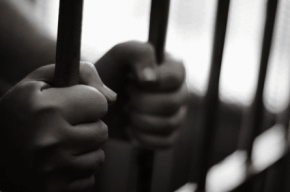A victim of Georgia justice
reports on another young life wrecked in Douglas County, Georgia.
WESLEY NELSON was a sophomore at Douglas County High School in Douglasville, Ga. He played on the basketball team at the local YMCA and was planning to try out for the football team his junior year.
He never got the chance. An older youth who went to his school approached him one afternoon and asked for Wesley's help in robbing a local store. According to Wesley, when he refused, the youth reminded him that he knew where Wesley lived, and promised to come and beat him up and shoot his mother.
Wesley knew the youth had guns; he had shown them off before. Scared and unable to ask for help from his friends, Wesley helped rob a store.
According to his mother, Rotunda Nelson, Wesley was scared of the youth, but not nearly so frightened as when police apprehended and interrogated him. Officers entered the Nelsons' house during the evening, using a battering ram with guns drawn. They took Wesley out of the house and questioned him without Rotunda present--and got a quick confession.
The lawyer Rotunda hired warned her that Wesley would have a tough time, given that the prosecutor was David McDade and the judge was David Emerson. These two men infamously engineered the conviction of Genarlow Wilson, a 17-year-old who was tried as an adult, found guilty of aggravated child molestation and sentenced to 10 years in prison--for having consensual oral sex with a woman who was two years younger than him. It took more than two years of legal battles and activist pressure to free Wilson.

During Wesley's trial, he pleaded not guilty, and his lawyer argued that Wesley was coerced into taking part in the robbery. But the judge ruled that much of the testimony and evidence supporting this claim was inadmissible, and that the jury shouldn't know about it.
Predictably, the jury found Wesley guilty, and Judge Emerson sentenced him to 20 years in jail--11 of which would be served in an adult prison.
The toll can be read in the lines on Rotunda Nelson's face. "I've aged ten years since this whole thing," she says.
Rotunda lost her job because she insisted on attending every day of her son's trial. The lawyer's fees kept mounting, even though they seemed unable to get Wesley moved to a juvenile facility. Wesley spent an extended period in solitary confinement, not because he was less than a model prisoner, but because prison authorities were still deciding his fate.
In a cruelly ironic twist, Rotunda had to sign a permission waiver for Wesley to take his GED. She pointed out that the authorities seemed to think her son was old enough to spend time in an adult prison--but not old enough to decide by himself if he should take the GED.
THE INCARCERATION of the innocent gets the most attention in examinations of the broken criminal justice system--and the effects of racism are obvious, especially in a southern state like Georgia.
One University of Michigan study suggests that thousands of innocent people remain in prison today, with African Americans disproportionately represented among them. While 29 percent of people in prison for rape are Black, 65 percent of people exonerated of the crime are.
But racism is a factor in every aspect of the criminal justice system, as a source of injustice for those who were wrongly convicted and for those who did commit some crime.
The sheer scale of the incarceration of African Americans is hugely disproportionate. According to Justice Department projections of current trends, a Black male born today has a one in three (32.2 percent) chance of spending time in state or federal prison in his lifetime.
A 2001 University of Georgia study of sentencing procedures for federal crimes found that the average white offender received 32 months in prison, while the average Black offender was sentenced to 64 months. And the researchers in that study found that disparities were even starker after taking account of the level of the offense, criminal history and other factors--they concluded that overall, Blacks got sentences 5.5 times longer than whites.
Plea-bargaining practices are another way that the racism of the system shows up. According to the San Jose Mercury News, "At virtually every stage of pretrial negotiation, whites are more successful than non-whites." Out of 71,000 adults charged with felonies and with no prior record, the Mercury News reported, one-third of whites had charges reduced to misdemeanors or infractions, but only one-quarter of Blacks received this option.
Wesley and Rotunda Nelson are just a few of the people whose lives have been torn apart by prejudicial sentencing and other practices of the U.S. injustice system. As long as judges and prosecutors with a racist agenda have the freedom to act as they see fit, the Wesleys of this world will bear the brunt.
But the case of Genarlow Wilson points a way forward--that raising our voices in protest can start to reverse the injustices.


